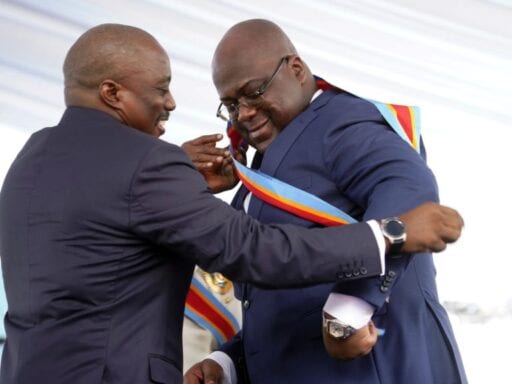But lingering doubts about the election’s legitimacy have dampened the milestone.
A new president was sworn in Thursday in the Democratic Republic of the Congo — the first peaceful transfer of power in the country since the country was granted independence from Belgium in 1960. But questions about the legitimacy of the election have clouded the otherwise historic inauguration.
DRC election officials named Félix Tshisekedi the winner of long-delayed elections earlier in January, despite evidence of voting irregularities and testimony from independent observers, including the Catholic Church, that contradicted the official results.
According to leaked election data from one of the country’s largest election observer groups, another opposition leader, Martin Fayulu, won with about 60 percent of the vote.
Fayulu, who is a former Exxon executive, challenged the election outcome in court and demanded a recount, but the court denied his request last week and affirmed Tshisekedi’s victory. The African Union, the United States, and the European Union have now given their tacit support to Tshisekedi.
Despite continued concerns about election fraud and the potential outbreak of violence, Tshisekedi’s swearing in on Thursday unfolded without incident. (The new president did leave the podium for a moment because he said he felt ill, but he soon returned, blaming exhaustion and emotion.)
In his inauguration speech, Tshisekedi offered hope for change in the DRC, a resource-rich country that has been wracked by corruption, conflict, and a recent deadly Ebola outbreak in its eastern region. He vowed to free all political prisoners, promised to tackle corruption, and heal the divisions within the country.
“We want to build a strong Congo in its cultural diversity,” Tshisekedi declared. “We will promote its development in peace and security. A Congo for each and everyone, where everybody has his or her own place.”
What happens now for the DRC?
Congolese will soon find out if their new president can — or will — deliver on his promises.
Tshisekedi, 55, is the son of Étienne Tshisekedi, a longtime and beloved opposition leader who died in 2017, and has benefitted from the legacy his dad built.
Tshisekedi is taking over the presidency from Joseph Kabila, the DRC’s president since 2001. Kabila’s term as president expired in 2016, but he continued to cling to power and postponed elections. Kabila, facing international pressure and protests, finally relented in and agreed to hold elections in December 2018.
But Kabila still wasn’t quite ready to relinquish control. In the 2018 elections, he hand-picked a crony and key ally, former interior minister Emmanuel Ramazani Shadary, to run for president. The opposition and government critics saw Shadary as merely a stand-in for Kabila until he staged a comeback, and worried the election would be rigged in his favor.
That, surprisingly, didn’t happen. Instead, Shadary came in third, and reportedly lost so badly that there was no way to skew the results without the risk of violence.
But then came a new twist — election officials’ decision to name Tshisekedi the winner, though independent observers suggested Fayulu, the other opposition leader, had won.
This has led to speculation among Kabila’s critics that Tshisekedi and Kabila struck some kind of backroom deal. Tshisekedi also has noticeably softened his stance against Kabila — after the election was over he praised him as “a partner in the democratic change in our country.”
Many election observers see Tshisekedi as more malleable than Fayulu, who ran on an aggressive anti-corruption campaign, saying Tshisekedi could be convinced to go easy on Kabila and his allies when he took office. (Aides for both have denied the allegations of a quid pro quo.) Kabila’s political party will also retain control of the legislature, likely boxing in Tshisekedi.
“The genius of it is that they rigged in favor of an opposition candidate who they could co-opt,” Jason Stearns, a Congo expert at the Center of International Cooperation, told the Washington Post. “This isn’t the worst that could have happened, but it’s a big blow to the idea of democracy in Congo.”
Fayulu, meanwhile, has declared himself the legitimate president, and has asked the Congolese people and the international community to recognize him as such.
I now consider myself as the sole legitimate President-elect of the #DRC. Therefore, I ask the Congolese people not to recognize any individual who would claim this authority illegally nor to obey orders that would emanate from such a person. #RDCVote #DRCElections pic.twitter.com/V2UaHm3A8L
— Martin Fayulu (@MartinFayulu) January 20, 2019
The international community has backed off some of its earlier statements questioning the DRC election results, based on the conclusions of the Congolese court. The US State Department, which had initially indicated it was awaiting “clarification of questions which have been raised regarding the electoral count,” offered support for the new president in a statement Wednesday.
“The US welcomes the certification of Felix Tshisekedi as the next president of the DRC,” State Department deputy spokesperson Robert Palladino said. “We are committed to working with the new government and encourage it to include a broad representation of Congo’s political stakeholders and to address reports of electoral irregularities.”
Fayulu has called on his supporters to participate in “non-violent protests” in support of his leadership. Though sporadic violence did break out in the wake of the election — the Wall Street Journal reported that 12 people died in clashes between supporters of Tsishekedi and Fayulu and government forces — any hints of widespread unrest appear to have subsided in recent days. There appears to be a level of acceptance — or resignation — that this might be the best outcome available and Kabila, at least, is finally out.
An untested opposition leader is now in charge, though how much independence he actually has — and how much power he’ll be able to wield — is still unclear.
Author: Jen Kirby
Read More



